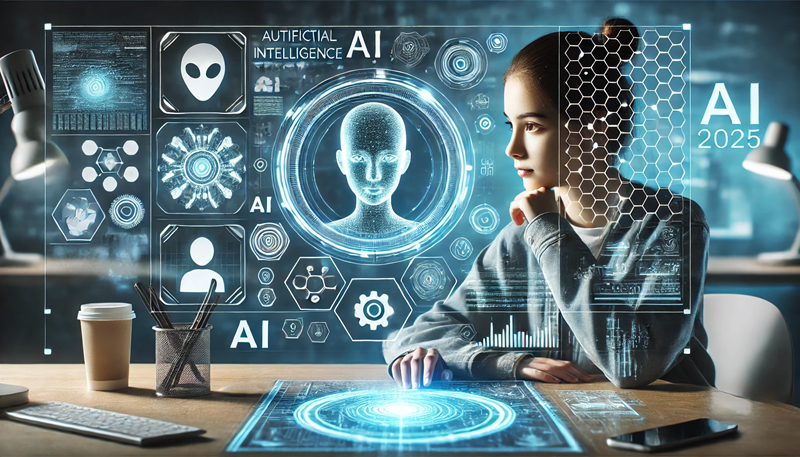Generative AI is evolving at an unprecedented pace, reshaping industries, revolutionizing workflows, and pushing the boundaries of what machines can create. From AI-generated content and real-time video synthesis to AI-powered coding assistants and hyper-personalization, 2025 is poised to be a breakthrough year for artificial intelligence.
But what are the biggest Generative AI trends to watch in 2025? How will businesses, developers, and content creators leverage this technology to unlock new possibilities?
In this article, we’ll explore:
✅ The top trends shaping Generative AI in 2025
✅ The impact of AI on industries like marketing, design, and software development
✅ How businesses can integrate Generative AI for growth
✅ Ethical concerns and future challenges
By the end, you’ll have a clear picture of where Generative AI is headed—and how you can stay ahead of the curve.
1. Multimodal AI: The Future of Intelligent Automation
Generative AI is no longer just about text or images. In 2025, Multimodal AI models are taking center stage, seamlessly combining text, images, video, and voice to create more intuitive and interactive AI-powered applications.
Leading AI firms like OpenAI, Google DeepMind, and Meta are developing AI models that can process and generate content across multiple formats simultaneously.
How Multimodal AI Works:
- AI-powered assistants can generate videos, images, and text-based responses in real-time.
- E-commerce businesses can use AI to create product descriptions, images, and promotional videos automatically.
- AI-generated content will become more interactive, enabling more immersive user experiences.
📌 Example: OpenAI’s GPT-4 Turbo and Sora AI are already demonstrating text-to-video AI capabilities, making content creation easier and more scalable.
2. AI-Generated Video Content Will Dominate Digital Media
2025 will be the year of AI-generated videos. As platforms like Sora AI (OpenAI), Runway ML, and Pika Labs improve, businesses and creators will start producing high-quality videos using AI alone—eliminating the need for expensive production teams.
What AI Video Technology Means for Businesses:
- Automated video ads and marketing campaigns tailored to audience preferences.
- AI-powered social media videos that boost engagement and brand awareness.
- News organizations leveraging AI to generate quick-turnaround video reports.
📌 Example: A fashion brand can use AI to generate influencer-style promotional videos with minimal human intervention.
3. AI-Powered Coding: The Rise of AI Developers
Generative AI is transforming software development, making coding faster, more efficient, and accessible to non-programmers.
With AI-powered coding assistants like GitHub Copilot, CodeWhisperer, and OpenAI Codex, developers can:
✅ Write, debug, and optimize code with AI suggestions.
✅ Automate repetitive coding tasks to increase productivity.
✅ Use natural language prompts to generate complex scripts and algorithms.
📌 Example: A startup can build an MVP (Minimum Viable Product) faster by leveraging AI-assisted coding tools, reducing time-to-market significantly.
4. Hyper-Personalization with AI: Transforming Customer Experiences
In 2025, AI-driven hyper-personalization will redefine marketing, e-commerce, and customer engagement. Companies will use Generative AI models to create:
- Personalized shopping experiences based on user behavior and preferences.
- AI-powered chatbots and virtual assistants that understand emotions and context.
- Customized AI-generated emails, ads, and social media content tailored to each customer.
📌 Example: An AI-powered recommendation engine in an online store could generate personalized product descriptions and dynamic visuals for every customer in real-time.
5. AI-Generated Art and Design: The Next Creative Revolution
The art and design world is witnessing a creative explosion with AI tools like DALL·E, MidJourney, and Stable Diffusion. In 2025, these platforms will become even more sophisticated, enabling:
✅ AI-powered branding and logo generation.
✅ 3D AI-generated product designs for businesses.
✅ AI-assisted UX/UI design to create optimized interfaces.
📌 Example: A startup can use AI-generated website layouts to create professional designs in minutes, reducing design costs.
6. Ethical AI & Regulation: Addressing the Challenges
As Generative AI becomes more powerful, concerns around ethics, deepfakes, and misinformation are growing. In 2025, we’ll see:
✔️ More AI regulations to ensure transparency and fairness.
✔️ AI watermarking and content verification tools to fight misinformation.
✔️ Companies adopting responsible AI policies to maintain ethical AI use.
📌 Example: Platforms like Google and OpenAI are developing tools to identify AI-generated content and combat deepfakes.
7. AI in Healthcare: Personalized Medicine and Diagnostics
Healthcare is being transformed by AI, enabling faster diagnoses, predictive analytics, and drug discovery. In 2025, we can expect:
✅ AI-powered virtual doctors and diagnosis assistants.
✅ Real-time patient monitoring using AI-driven analytics.
✅ AI-assisted medical research to accelerate drug development.
📌 Example: A hospital can use AI-powered chatbots to assist patients, reducing waiting times and improving efficiency.
How Businesses Can Prepare for the Future of Generative AI
With AI continuing to evolve, businesses need to stay ahead of the curve by:
✔️ Investing in AI-powered tools for content creation, automation, and customer engagement.
✔️ Training teams to work alongside AI models to improve efficiency.
✔️ Focusing on ethical AI adoption to build trust with users.
Companies that integrate Generative AI early will have a competitive edge in automation, personalization, and efficiency.
Final Thoughts: What’s Next for Generative AI?
Generative AI is no longer a futuristic concept—it’s redefining industries today. From AI-generated content and automation to AI-powered healthcare and marketing, 2025 will be a transformational year for artificial intelligence.
🚀 Key Takeaways:
✅ Multimodal AI models will drive innovation across industries.
✅ AI-generated videos will reshape digital content creation.
✅ AI-powered coding assistants will make software development more efficient.
✅ Hyper-personalization will improve customer engagement.
✅ The ethical use of AI will become a major focus for businesses.
Businesses, developers, and creators who embrace AI-driven technology will stay ahead of the competition and unlock new possibilities in the digital era.
💡 Want to integrate Generative AI into your business? Start today!
